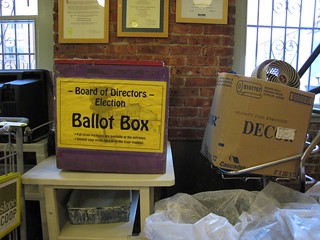
Davis v. Peel Condominium Corporation No. 22, 2013 ONSC 3367 (CanLII)
Decision Date: June 7, 2013
As readers will probably know, condo board members may be removed from a board before the end of their term if more than half of all unit owners vote to remove them. However, according to the Condominium Act, owners are not eligible to vote if, at the time of the meeting, any contributions payable with respect to their units have been in arrears for more than 30 days. A group of owners at PCC 22 requested a meeting with the intention of removing the board. At the meeting, held in October 2012, the lawyer representing the corporation ruled that 12 proxy votes were ineligible due to unpaid accounts, relying on records supplied by the property management company. The group that had requested the meeting brought their own lawyer. She objected to the first lawyer’s appointment as chair of the meeting (on the grounds that the person who appointed him was not authorized to do so) and was herself elected chair by a majority of those present. Based on updated information, she ruled that the 12 proxy votes were indeed eligible and the board was voted out.
Ms Davis, a unit owner, brought an application alleging that the second lawyer had acted in bad faith and had allowed “ballots in the box that should not have been in there.” The judge rejected the application. He reviewed the information that the second lawyer had used to accept the proxies and ruled that three had been incorrectly allowed. Yet given the margin of victory in favour of removing the directors, these incorrectly accepted proxies did not make a difference to the outcome of vote.
Comment: An accusation of bad faith is serious; persons are presumed to act in good faith unless proven otherwise. (See the Supreme Court of Canada ruling in Blair v. Consolidated Enfield Corp.)
Taipaleenmaki v. M.T.C.C. 1053, 2013 HRTO 1100
Decision Date: June 20, 2013
In December 2010, Ms Taipaleenmaki, a unit owner, was asked to remove a Christmas plaque from her door. She filed an application with the HRTO alleging discrimination on the basis of creed. The application was settled at mediation one year later. In the current application Ms Taipaleenmaki alleges a pattern of harassment by the Board that is a reprisal (or threat of reprisal) for the earlier complaint. She submits that the Board has refused to meet with her on a number of occasions to discuss a wide variety of issues (including a new non-discrimination policy, the Privacy Act, a monthly maintenance fee increase, window washing, and the Veterinarians Act of Ontario, to name a few), that the president of the Board ignored her questions at condominium meetings, and that several of her postings to the condominium’s website were removed.
The Adjudicator dismissed the application as having no reasonable prospect of success. Ms Taipaleenmaki provided no evidence that the Board’s actions constituted a reprisal or attempt at reprisal. Although the Board declined to meet with her, they suggested that a Committee meeting or Town Hall meeting would be a more appropriate forum for her concerns. When Ms Taipaleenmaki’s posts were removed from the condo’s website, a letter from the Board’s lawyer advised her that these posts were defamatory and asked her to abide by the rules for posting. While there are a number of outstanding disagreements between Ms Taipaleenmaki and the Board, and she feels aggrieved, the HRTO cannot deal with general allegations of unfairness.
Comment: Disagreements in themselves are not necessarily evidence of human rights violations.
No comments:
Post a Comment